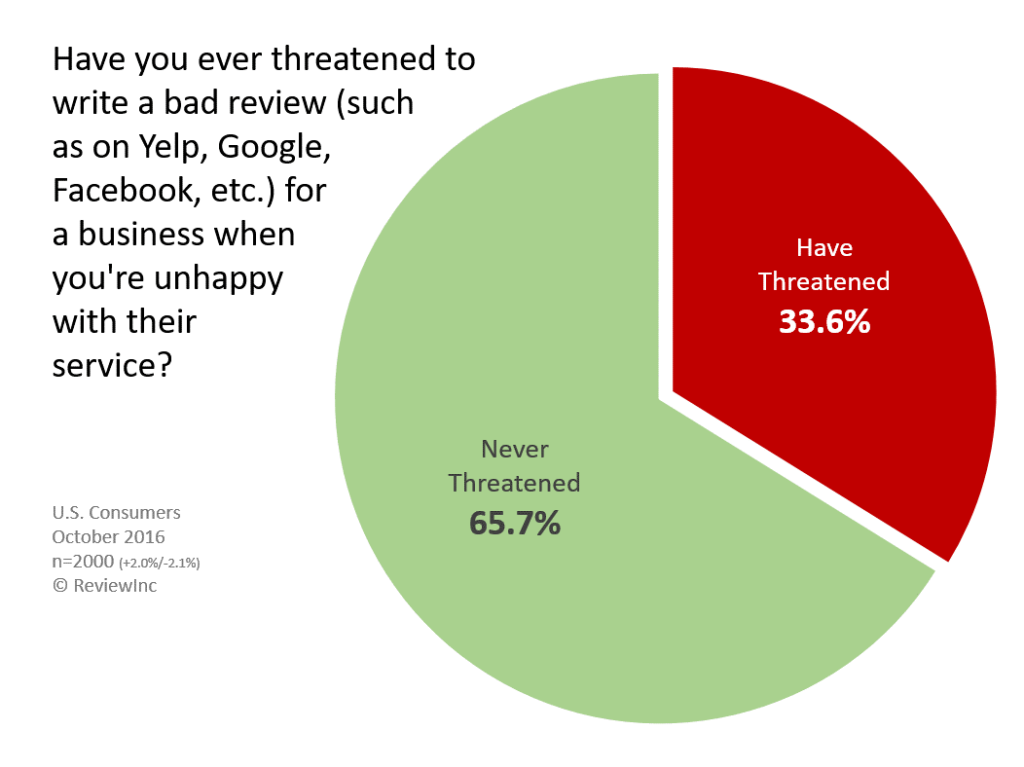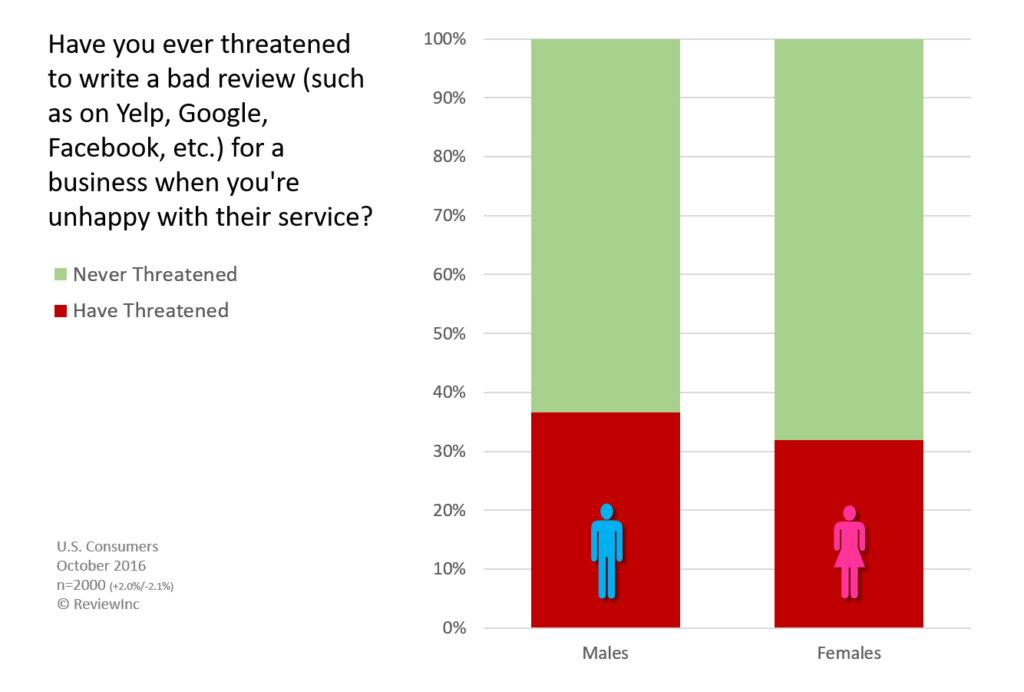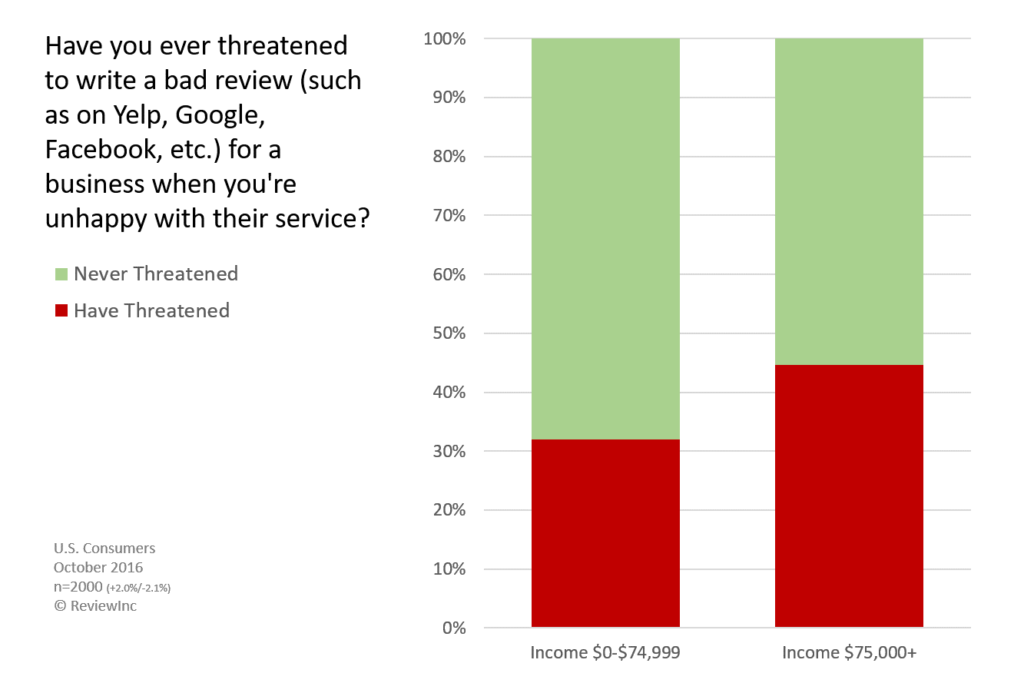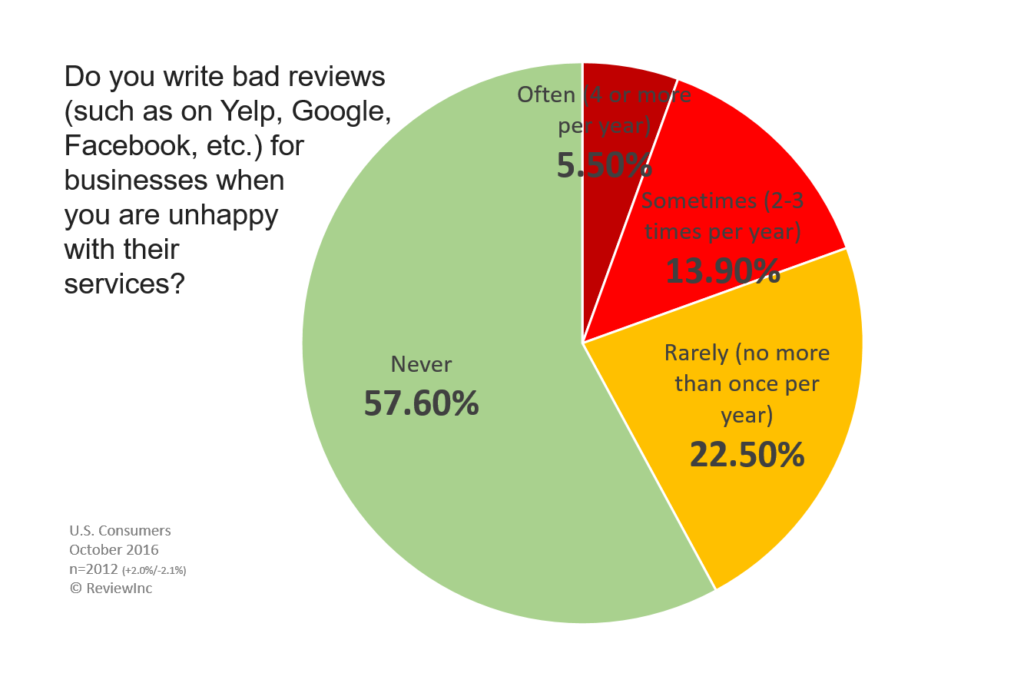
In today’s reputation based economy, a bad review can wreak havoc on most any business. Consumers have wised up to this and use it as leverage to get their way with businesses and services by just threatening to write a bad review. But how often do consumers do this and do they follow through with it?
In October 2016, ReviewInc conducted a consumer survey of 2,000 U.S. Consumers asking if they have ever threatened to write bad reviews (such as on Yelp, Google, Facebook, etc.) for a business when they have been unhappy with their service.
The survey found that while nearly two thirds of consumers have never threatened a business with a negative review, that more than one third of consumers have threatened a business with a bad review when they were unhappy.
 When examining the data by gender, males were about 10% more likely to threaten a negative response than females.
When examining the data by gender, males were about 10% more likely to threaten a negative response than females.
 Age group also matters. The older the customer, the less likely they are to threaten negative feedback.
Age group also matters. The older the customer, the less likely they are to threaten negative feedback.
 Even income levels mattered showing that the higher customers’ income level, the more likely they are to write a review.
Even income levels mattered showing that the higher customers’ income level, the more likely they are to write a review.
 So a millennial male making more than $75,000/year is the most likely to threaten to write a negative review, where as a women over 55 years old making less than $75,000/year is the least likely to threaten writing of a bad review.
Whether they actually follow through with their threats is hard to gauge, but we did conduct another survey asking how many negative reviews consumers actually wrote. The good news is that 57.6% never actually wrote a review and only 5.5% regularly write negative feedback.
So a millennial male making more than $75,000/year is the most likely to threaten to write a negative review, where as a women over 55 years old making less than $75,000/year is the least likely to threaten writing of a bad review.
Whether they actually follow through with their threats is hard to gauge, but we did conduct another survey asking how many negative reviews consumers actually wrote. The good news is that 57.6% never actually wrote a review and only 5.5% regularly write negative feedback.
 So what should a business do?
First and foremost, make sure you deliver a great product and great service. Those two ingredients make the best case for obtaining good reviews and minimize the likelihood that anyone will write a bad review. In most cases, businesses are likely to receive more positive reviews than negative reviews. If that is not the case, the business might want to take a long hard look in the mirror.
Businesses should also encourage their customers to give them honest feedback (either privately or on a popular review site). Furthermore, businesses should act on the feedback by improving where they under-perform and reinforcing where they over-perform.
This advice might seem obvious to some, but our experience is that most businesses shy away from asking for feedback simply out fear of criticism or even the unknown. But hey, we are in a reputation-based economy, so it’s time to “get with the program”.
So what should a business do?
First and foremost, make sure you deliver a great product and great service. Those two ingredients make the best case for obtaining good reviews and minimize the likelihood that anyone will write a bad review. In most cases, businesses are likely to receive more positive reviews than negative reviews. If that is not the case, the business might want to take a long hard look in the mirror.
Businesses should also encourage their customers to give them honest feedback (either privately or on a popular review site). Furthermore, businesses should act on the feedback by improving where they under-perform and reinforcing where they over-perform.
This advice might seem obvious to some, but our experience is that most businesses shy away from asking for feedback simply out fear of criticism or even the unknown. But hey, we are in a reputation-based economy, so it’s time to “get with the program”.
 When examining the data by gender, males were about 10% more likely to threaten a negative response than females.
When examining the data by gender, males were about 10% more likely to threaten a negative response than females.
 Age group also matters. The older the customer, the less likely they are to threaten negative feedback.
Age group also matters. The older the customer, the less likely they are to threaten negative feedback.
 Even income levels mattered showing that the higher customers’ income level, the more likely they are to write a review.
Even income levels mattered showing that the higher customers’ income level, the more likely they are to write a review.
 So a millennial male making more than $75,000/year is the most likely to threaten to write a negative review, where as a women over 55 years old making less than $75,000/year is the least likely to threaten writing of a bad review.
Whether they actually follow through with their threats is hard to gauge, but we did conduct another survey asking how many negative reviews consumers actually wrote. The good news is that 57.6% never actually wrote a review and only 5.5% regularly write negative feedback.
So a millennial male making more than $75,000/year is the most likely to threaten to write a negative review, where as a women over 55 years old making less than $75,000/year is the least likely to threaten writing of a bad review.
Whether they actually follow through with their threats is hard to gauge, but we did conduct another survey asking how many negative reviews consumers actually wrote. The good news is that 57.6% never actually wrote a review and only 5.5% regularly write negative feedback.
 So what should a business do?
First and foremost, make sure you deliver a great product and great service. Those two ingredients make the best case for obtaining good reviews and minimize the likelihood that anyone will write a bad review. In most cases, businesses are likely to receive more positive reviews than negative reviews. If that is not the case, the business might want to take a long hard look in the mirror.
Businesses should also encourage their customers to give them honest feedback (either privately or on a popular review site). Furthermore, businesses should act on the feedback by improving where they under-perform and reinforcing where they over-perform.
This advice might seem obvious to some, but our experience is that most businesses shy away from asking for feedback simply out fear of criticism or even the unknown. But hey, we are in a reputation-based economy, so it’s time to “get with the program”.
So what should a business do?
First and foremost, make sure you deliver a great product and great service. Those two ingredients make the best case for obtaining good reviews and minimize the likelihood that anyone will write a bad review. In most cases, businesses are likely to receive more positive reviews than negative reviews. If that is not the case, the business might want to take a long hard look in the mirror.
Businesses should also encourage their customers to give them honest feedback (either privately or on a popular review site). Furthermore, businesses should act on the feedback by improving where they under-perform and reinforcing where they over-perform.
This advice might seem obvious to some, but our experience is that most businesses shy away from asking for feedback simply out fear of criticism or even the unknown. But hey, we are in a reputation-based economy, so it’s time to “get with the program”. 








